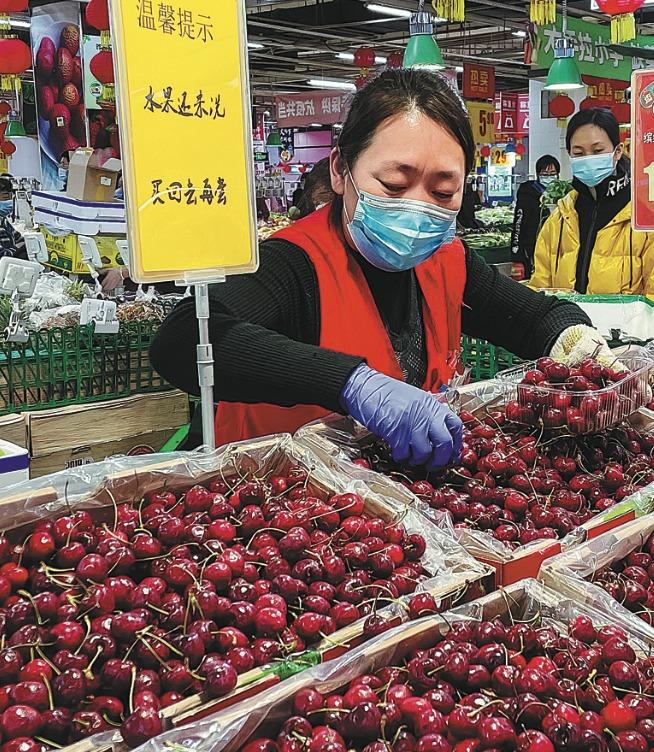 A staff member packs imported cherries in a supermarket in Beijing on Jan 17, 2021. (DENG WEI / FOR CHINA DAILY )
A staff member packs imported cherries in a supermarket in Beijing on Jan 17, 2021. (DENG WEI / FOR CHINA DAILY )
As fears about COVID-19 transmission via food products spread to fruits and popular snacks, experts said the risk of consumers being infected by the novel coronavirus from eating imported food is relatively minimal.
Health authorities in Shandong province said on Monday that a company in Zaozhuang had used a batch of whey powder that tested positive for the virus on Jan 18 to make dried dates covered in milk powder-a sweet snack that has gained popularity among Chinese consumers in recent months.
As of Monday, more than 20 metric tons of products affected by the contaminated whey powder had been sold in at least 25 provincial-level regions across the country, local officials said.
There is no need for individuals who have already eaten these dates to panic because no infections have been reported to be caused by eating cold-chain food products.
Lei Jie, Chief expert at Shandong's center for disease control and prevention
All people involved who had been tracked down had tested negative for the virus, they added.
ALSO READ: Cold-chain goods major cause of infections
Lei Jie, chief expert at Shandong's center for disease control and prevention, said, "There is no need for individuals who have already eaten these dates to panic because no infections have been reported to be caused by eating cold-chain food products."
Last month, disease control officials in Wuxi, Jiangsu province, and Shijiazhuang, Hebei province, reported that some imported cherries tested positive for the virus during routine checks.
Though rapid tests on packaging, stalls and people involved in handling contaminated cherries were all negative, and disinfection measures were swiftly implemented, many shoppers have shunned the stone fruit.
"I like cherries but can't afford to eat them often due to their high price. Now I've stopped buying cherries completely because I am worried about the risk of the virus," said Han Shuang, a 28-year-old Beijing resident.
"I'll wait until experts confirm that people cannot contract the virus from them."
READ MORE: China vows to stem COVID-19 spread through imported foods
Some fruit vendors are feeling the pinch.
Zhang Jingsong, a fruit wholesaler in Nantong, Jiangsu, said he used to sell about 30 boxes of cherries weighing five kilograms every day. After the news about cherries testing positive for the virus broke, daily sales plunged to almost zero.
"No new orders came in that day and some regular shoppers decided to cancel orders and requested a refund," he said.
In response, public health and food safety experts have assured people it is highly unlikely they will become infected by touching or eating food products.
Wu Zunyou, chief epidemiologist at the Chinese Center for Disease Control and Prevention, said the viral load detected on imported products and their packaging was low
"Live viruses, dead viruses and fragments of viruses can all show positive results in nucleic acid tests," said Zhu Yi, associate professor at China Agricultural University's College of Food Science and Nutritional Engineering.
"In terms of the imported cherries that tested positive recently, we are sure that they were contaminated, but cannot confirm that they were contagious."
She added that due to the disease being rampant overseas, it is unlikely all imported cherries will be clear of traces of the virus.
"As long as the country of origin is experiencing outbreaks, more products are bound to test positive for the virus," she said.
"People at the highest risk of being infected are port workers who fail to abide by precautionary measures in handling goods from overseas."
READ MORE: China steps up prevention of COVID-19 via cold chain
Wu Zunyou, chief epidemiologist at the Chinese Center for Disease Control and Prevention, said the viral load detected on imported products and their packaging was low.
"In most cases, infections stemming from contaminated objects only occur when contamination is severe and individuals are exposed to the virus repeatedly," he said, with cold-chain workers especially vulnerable.
Zhang, the fruit vendor, said people seemed to have regained their appetite for cherries as he had sold about 10 boxes in the past few days. "But I am still worried," he said.
"I might have to wait until the pandemic is completely subdued for my business to return to normal."


